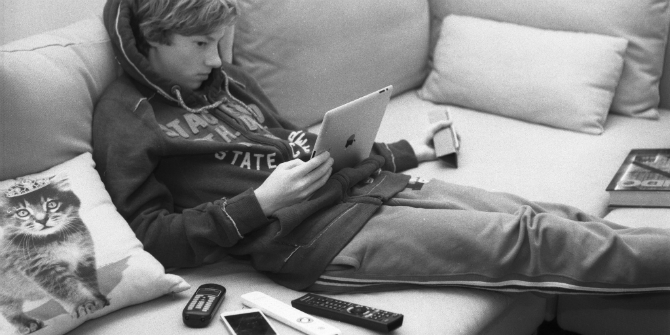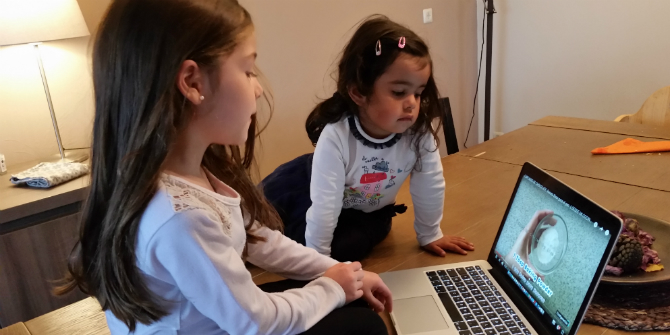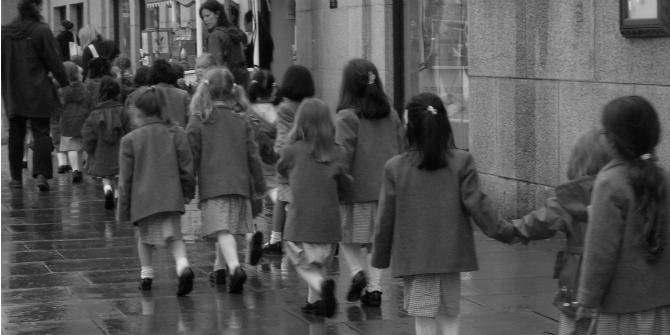 Credit: M. Dries, CC BY-NC-ND 2.0
Credit: M. Dries, CC BY-NC-ND 2.0
 Leslie Haddon is a visiting lecturer in the Department of Media and Communications at the London School of Economics. As a senior researcher he helped coordinate the EU Kids Online project, examining online risks and children. Here he reports on the qualitative research in which he was involved, specifically looking at children’s criticisms of how parents manage their internet experience.
Leslie Haddon is a visiting lecturer in the Department of Media and Communications at the London School of Economics. As a senior researcher he helped coordinate the EU Kids Online project, examining online risks and children. Here he reports on the qualitative research in which he was involved, specifically looking at children’s criticisms of how parents manage their internet experience.
One of the very positive findings from the quantitative research conducted for EU Kids Online was that in general children appreciated their parents’ interventions in how they used the internet.
- The vast majority of 9- to 16-year-olds talk to their parents about what they do online.
- They think that their parents know a good deal about their online activities.
- They often heed rules and advice, even when told not to do something.
- On the whole, they are happy about the degree to which their parents take an active interest.
This doesn’t mean that children are always so positive. The EU Kids Online qualitative research highlights some of the things children say when they are being critical.
Credibility of parental advice
Especially for children aged 11 onwards, several factors undermine the credibility of parents’ concerns, rules, advice or reactions. One was when the children felt their parents simply did not appreciate how the internet worked. For example, some noted how, while their siblings and peers understood how easily sexual material simply popped up on their screens, their parents always assumed the children must have been looking for it.
Another was when they thought that their parents had got the online world out of perspective. For example, they noted that their parents would advise them to avoid violence, sexual material and bad language online, even though they encountered all these things offline – on television, in newspapers and in the playground – as a matter of ordinary experiences.
And some parental claims were simply too determinist. As one boy put it, if parents warned, “you’ll be addicted”, in his eyes this gave him no agency. Instead, he argued, “it depends on who you are… it depends on whether you’re smart enough”.
Privacy from parents
It is one thing for children to check in occasionally to let their parents know what they are doing online. That was acceptable. But it was more intrusive, especially as children got older, when parents checked up on them, for example, by monitoring their internet histories.
Sometimes resentment arose because the children thought they were now old enough to be more independent, and should be allowed to make their own decisions. They thought that they had (or should have) surely earned their parents’ trust by now. It wasn’t necessarily that they were doing ‘dodgy’ things, but they simply wanted to keep the social worlds of their parents and peers apart. They behave differently in front of these two different audiences, and so they referred to their ‘right’ to some privacy, or their parents’ ‘invasion’ of that privacy. And if their parents weren’t willing to grant them privacy, that led to some discontent and even deception on the children’s part.
Not confiding in parents
A striking outcome from the EU Kids Online survey was how the children were willing to talk to their parents about most everyday experiences online, but they did so far less in relation to sensitive topics. For example, they were more likely to talk to their peers than to parents when they had encountered sexual content, bullying or strangers online – areas where their parents had usually set rules. In fact, they were often more worried about their parents finding out about these things than they were about the online risks themselves.
For example, a number noted that if sexual pop-ups or links that unexpectedly took you to sexual sites did appear, it was best not to tell their parents. Sometimes this was because their parents had already threatened them with punishment if they broke the rules. Or they anticipated that their parents would get angry with them or (just as bad) be critical of them. Or they would lose their parents’ trust. And some were just too embarrassed to talk about such online experiences with their parents, even when they found them to be problematic.
Pitfalls of parenting
Parents are often advised to engage with their children’s online lives, to be a support for them, and it would appear that many take this on as part of the parental role. On the whole, the outcome is positive, but the examples above underline some of the pitfalls for parents. The credibility issue illustrates how parents cannot always command respect for their advice through asserting authority. Rather, they need to win respect from their children – or, as in the above examples, try to avoid losing legitimacy.
As regards privacy, many children can understand the parental perspective: “they probably have a duty to worry”. But parents should appreciate their children’s aspirations as they move towards adulthood, reflected in their desire for more privacy.
Various anticipated reactions from parents create barriers to children confiding in them about sensitive issues. Children must therefore feel confident that they would get a sympathetic ear if that reticence is to be overcome.





